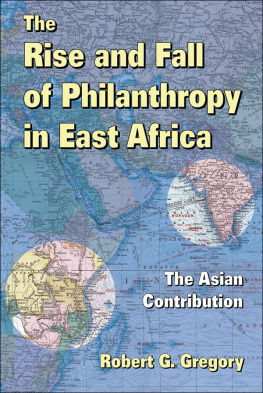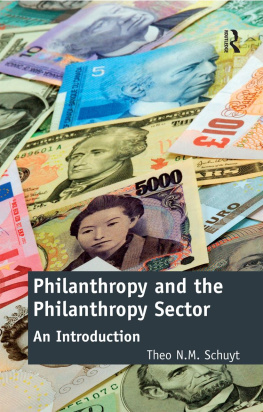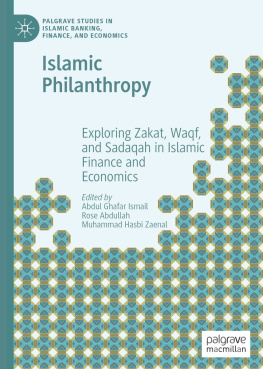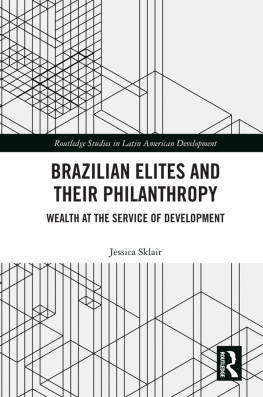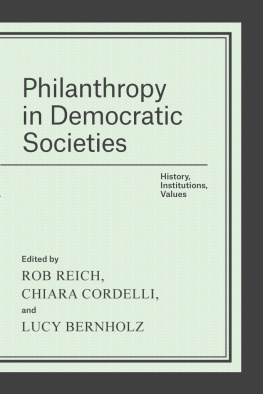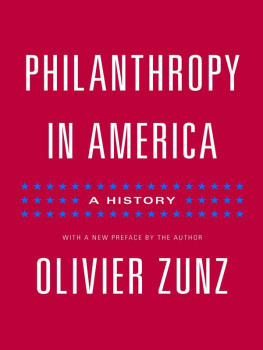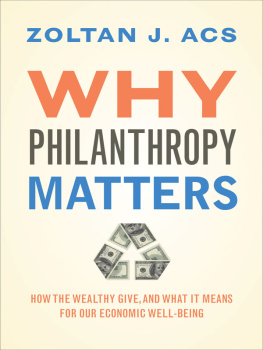PHILANTHROPY
IN THE
WORLDS
TRADITIONS
PHILANTHROPIC STUDIES
Robert L. Payton and Dwight F. Burlingame,
GENERAL EDITORS
ALBERT B. ANDERSON
Ethics for Fundraisers
KAREN J. BLAIR
The Torchbearers: Women and Their Amateur Arts Associations in America
DWIGHT F. BURLINGAME, EDITOR
The Responsibilities of Wealth
DWIGHT F. BURLINGAME AND DENNIS YOUNG, EDITORS
Corporate Philanthropy at the Crossroads
MARCOS CUETO, EDITOR
Missionaries of Science: The Rockefeller Foundation and Latin America
GREGORY EISELEIN
Literature and Humanitarian Reform in the Civil War Era
JEROME L. HIMMELSTEIN
Looking Good and Doing Good: Corporate Philanthropy and Corporate Power
THOMAS H. JEAVONS
When the Bottom Line Is Faithfulness: Management of Christian Service Organizations
MIKE W. MARTIN
Virtuous Giving: Philanthropy, Voluntary Service, and Caring
MARY J. OATES
The Catholic Philanthropic Tradition in America
J. B. SCHNEEWIND, EDITOR
Giving: Western Ideas of Philanthropy
DAVID H. SMITH
Entrusted: The Moral Responsibilities of Trusteeship
PHILANTHROPY
IN THE
WORLDS
TRADITIONS
Edited by
Warren F. Ilchman,
Stanley N. Katz,
and
Edward L. Queen II
This book is a publication of
Indiana University Press
601 North Morton Street
Bloomington, Indiana 47404-3797 USA
www.indiana.edu/~iupress
Telephone orders 800-842-6796
Fax orders 812-855-7931
Orders by e-mail
1998 by Indiana University Press
All rights reserved
No part of this book may be reproduced or utilized in any
form or by any means, electronic or mechanical, including
photocopying and recording, or by any information
storage and retrieval system, without permission in writing
from the publisher. The Association of American
University Presses Resolution on Permissions constitutes
the only exception to this prohibition.
The paper used in this publication meets the minimum
requirements of American National Standard for
Information SciencesPermanence of Paper for Printed
Library Materials, ANSI Z39.481984.
Manufactured in the United States of America.
Library of Congress Cataloging-in-Publication Data
Philanthropy in the worlds traditions / edited by Warren F. Ilchman,
Stanley N. Katz, and Edward L. Queen, II.
p. cm.
Includes bibliographical references and index.
ISBN 0-253-33392-X (cl : alk. paper)
1. CharitiesCross-cultural studies. 2. CharitiesHistory
Cross-cultural studies. 3. Social serviceCross-cultural studies.
4. Social serviceHistoryCross-cultural studies. 5. Social
serviceReligious aspects. I. Ilchman, Warren Frederick.
II. Katz, Stanley Nider. III. Queen, Edward L.
HV16.P46 1998
361.763209dc21 97-51241
1 2 3 4 5 03 02 01 00 99 98
CONTENTS
/ WARREN F. ILCHMAN, STANLEY N. KATZ, AND EDWARD L. QUEEN II
/ STEVEN FEIERMAN
/ JOHN A. GRIM
/ LEONA ANDERSON
/ ANANDA W. P. GURUGE AND G. D. BOND
/ LESLIE S. KAWAMURA
/ SAID AMIR ARJOMAND
/ JOANNA F. HANDLIN SMITH
/ MARY EVELYN TUCKER
/ DEREK J. PENSLAR
/ AMANDA PORTERFIELD
/ MIROSLAV RUICA
/ MARK JUERGENSMEYER AND DARRIN M. McMAHON
/ GREGORY C. KOZLOWSKI
/ ADELE LINDENMEYR
/ VIVIENNE SHUE
/ ANDRS A. THOMPSON AND LEILAH LANDIM
INTRODUCTION
WARREN F. ILCHMAN, STANLEY N. KATZ, AND
EDWARD L. QUEEN II
This book represents a significant addition to the comparative study of philanthropy and culture. In no other volume have a variety of area specialists been asked to turn their attention to the role of philanthropyof giving and sharing beyond the familyin the life of a particular culture at a particular time. That so little attention has been paid to this subject is surprising. One need only consider the role that philanthropy has played in defining and sustaining numerous religious traditions, e.g., Buddhism, in the establishment of a wide range of educational and cultural institutions, and, perhaps most visibly, the construction of innumerable public buildings and facilitiesroads, khans, fountains, etc. The sheer magnitude of this construction undertaken throughout history should have made that activity a prime candidate for study. However, such has not been the case.
The presumption at the outset of this work was that something called philanthropyrooted in the ethical notions of giving and serving to those beyond ones familyprobably existed in most cultures and in most historical periods, and that it often was driven by religious traditions. In making this presumption, however, the editors recognized the difficulty in choosing an appropriate generic term for the activities we hoped the authors would examine. In dealing with many cultures in a variety of historical periods, the editors realized that we would run up against the problem of overidentifying what was culturally possible. Just as it would be inappropriate to condemn those in the fourteenth century for failing to make the necessary hygienic responses to the outbreak of the Black Death, so it would be inappropriate to look for nineteenth/twentieth-century North Atlantic understandings of philanthropy in other times and places. For that reason, we have dispensed with the charity/philanthropy distinction. The distinction is of recent invention, linked with a belief in instrumental rationality, progress, and professionalization. Absent these realities, as well as the existence of the modern state, either the distinction makes no sense, or there can be no philanthropy. All that would be left for the subject matter of these essays would be charity, good deeds, and beneficence. This may be a valid way of approaching the issue, but it leaves open the question of what generic term identifies these seemingly related activities. The editors decided, therefore, to retain philanthropy as the most useful term to connect this set of behaviors and activities sharing marked family resemblances. Certainly in many ways it is a vague abstraction, but so are the state, the law, and religion and we find ways to talk about them. Although there remain ragged edges where clarity eludes us, we usually find these concepts understandable and useful both in ordinary language and in academic discourse. There is no reason why philanthropy should be any less useful.
In this volume philanthropy, understood primarily as activities of voluntary giving and serving to others beyond ones family, is the collective term. In using it we owe a debt to Robert Paytons definition of philanthropy as voluntary action for the public good. Encompassing as it does the activities of voluntary giving, voluntary service, and voluntary association, this definition helps us analyze the role philanthropy plays in different cultures and in peoples attempts to realize their understandings of the good through actions or donations. One of the significant results is that philanthropic acts become the preeminent means by which people attempt to realize their understanding of cultural values, to practice what their culture preaches.


